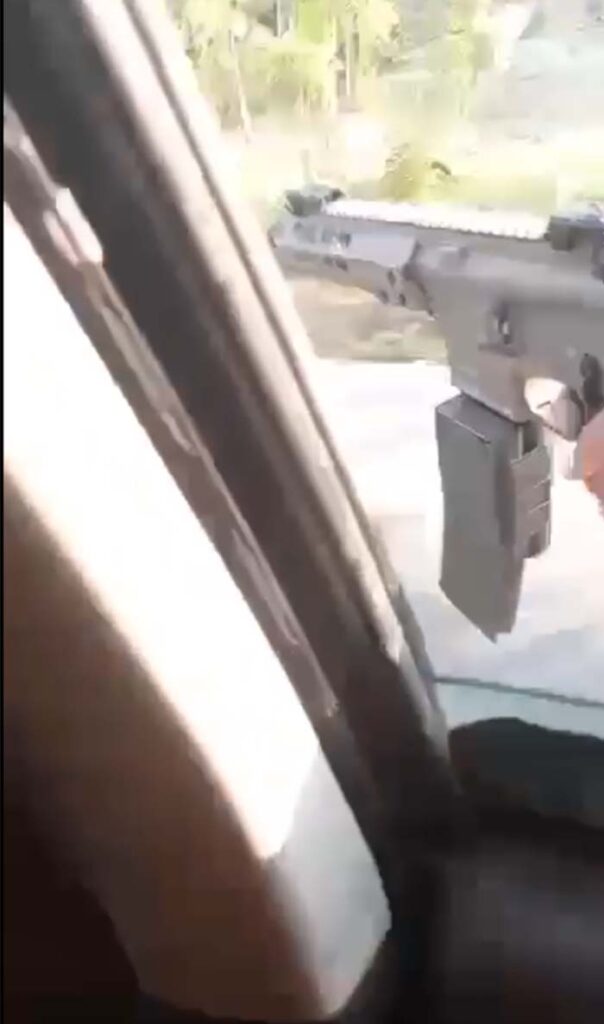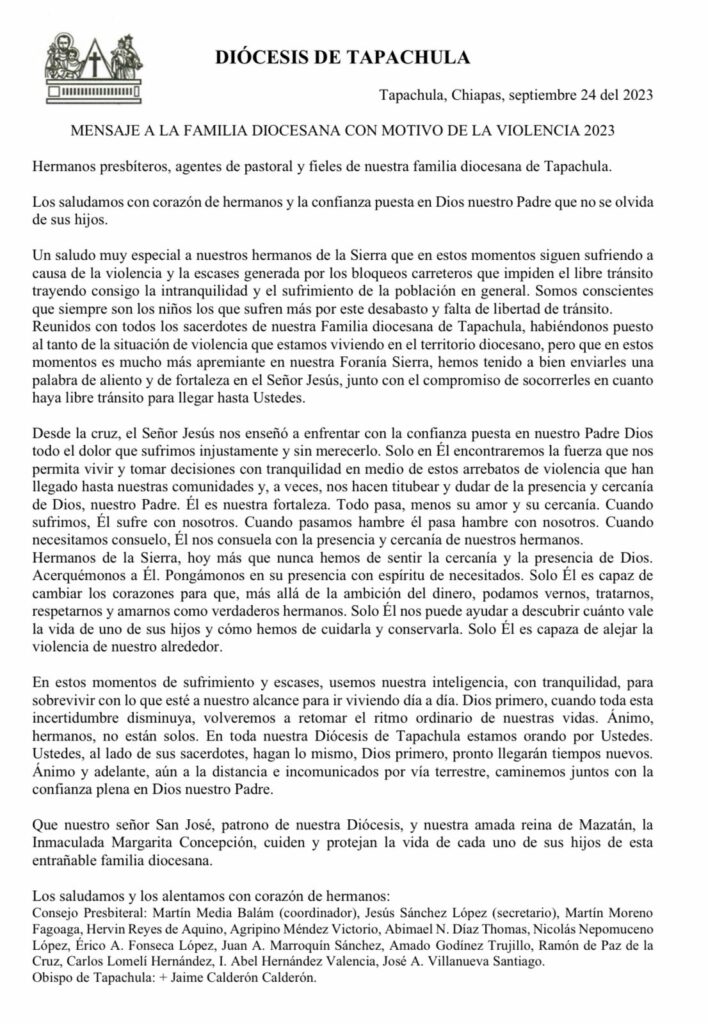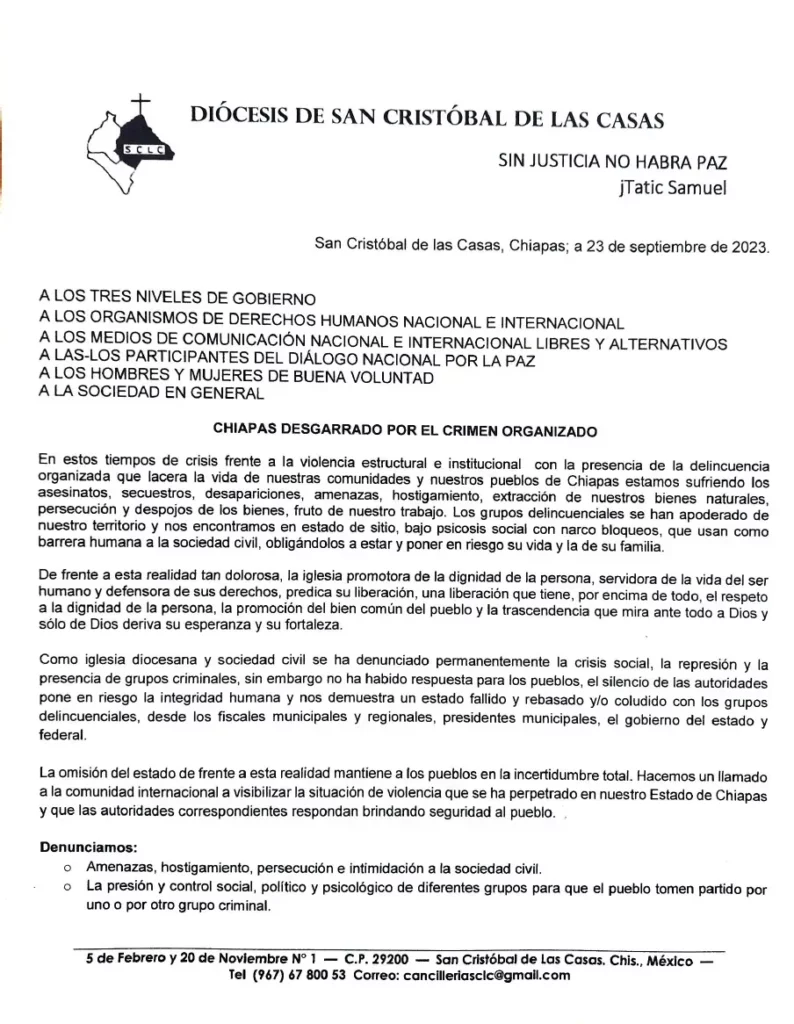As part of their strategy, the drug cartels have intensified the forced recruitment of the population. According to testimonies from family members, people are being forced to demonstrate on the highways, to lead marches in support of one group or another, or to serve as hired assassins.
They are forced to participate as human shields and soldiers in the war between Mexican cartels for control of the country’s southern border. They have been unable to leave the area for two weeks.
On Saturday, September 23, a line of men and women were forced to stand in two lines on the side of the road in the community known as Chamic, one of the gateways to the border zone between Mexico and Guatemala. Most with a backpack over their shoulders, they tried to hide their faces with bandanas or masks from the camera that recorded them.
“Pure Sinaloa!” some shouted in allusion to the Sinaloa Cartel (CDS), while, as if it were a military parade, trucks adapted to look like war tanks were parading by. On board were men in military-style uniforms carrying submachine guns and other long arms.
It was a message of war directed at the opposing cartel, the Jalisco Cartel – New Generation (CJNG), which for a little more than four years has been involved in the dispute over the trafficking routes that pass through this region bordering the Guatemalan border.
The dispute for territory between cartels has been intensifying and in this war between cartels more than 280,000 inhabitants of the municipalities of Frontera Comalapa, Chicomuselo, Motozintla, Siltepec, Amatenango de la Frontera, Mazapa de Madero, La Grandeza and El Porvenir have been trapped in this region alone.
“They took my brother-in-law out of his house, they took him to the central park in Siltepec. There they have the men, they ask them if they know how to shoot. They are arming them and forcing them to confront each other. Please help us spread the word,” reads one of the many messages that the population, caught up in this war, has managed to send.
In the case of Siltepec, as in the case of Motozintla and Frontera Comalapa, the municipal capitals are under the control of the CJNG, but since September 7 they have been surrounded by members of the opposing cartel, and for this reason they have intensified the forced recruitment of the population, with the intention that they go out to confront each other to break the siege.
Since that date, no one has been able to enter or leave the area. There is no supply of gasoline or food, and in some places criminal groups have cut power and communication lines.
State and federal authorities have denied the seriousness of the situation suffered by the population trapped in this dispute between organized crime groups, but it was the teachers of Sections 7 and 40 of the National Union of Education Workers (SNTE) who made this reality official.
Some 5,000 teachers in the municipalities of the highlands and border areas who attend preschool, elementary, middle and high school students suspended work and left the area, but not before sending letters to the educational authorities.
“In light of the negligence and absenteeism of the relevant authorities to confront the criminal acts committed by criminal groups (…) we have decided to temporarily suspend teaching activities in all schools in the school zone (…) We have the need and obligation to demonstrate in light of the critical situation and the wave of violence that is occurring in our region,” stated some of the letters.
As part of their strategy, the two drug cartels have intensified the forced recruitment of the population. According to testimonies from family members, people are being forced to demonstrate on the highways, to lead marches in support of one group or the other, or to serve as hired assassins.

They explained that at first they were forced to pay fines of 2,000 pesos if they refused to participate in roadblocks to prevent the passage of cars with armed men. Then they offered to pay them 1,000 pesos a day for each young person who voluntarily joined; as their ranks did not swell, they began to forcibly remove them from their homes.
In the videos released by these groups, young people and adults, men and women, can be seen wearing worn and simple clothes, because in this region more than 80 percent of the population is dedicated to agricultural activities.
From September 7 to date, one and the other group has sent videos of people standing in line shouting slogans; others with images of murders, some more recorded from inside the vehicles where they are transported.
One of them stands out, where a voice with a Central American accent says: “Acá puro señor Mencho (Here it’s all CJNG). Testimonies from residents indicate that the groups recruited people from Central America.
On the Guatemalan side, the Guatemalan military set up checkpoints in an attempt to prevent the confrontations between Mexican cartels from spreading to their country.
“The Mountain Operations Brigade was present in the municipality of Tacaná, with the purpose of recovering control in the area of jurisdiction, due to the threats they have been suffering (…) threats from Mexican cartels that are currently operating in the area of Motozintla, Chiapas, and that at some point could move into Guatemalan territory,” explained a Guatemalan military officer.
“Chiapas, torn apart by organized crime,” was the headline of the communiqué sent by the Diocese of San Cristobal de Las Casas on Saturday, September 23. Its parishioners are part of the population trapped by organized crime groups.
The Diocese of Tapachula also made a statement. In a communiqué addressed to the three levels of government, both Dioceses detailed: the state is living “times of crisis in the face of structural and institutional violence with the presence of organized crime that damages the life of the communities and the people of Chiapas are suffering from murders, kidnappings, disappearances, threats, harassment, extraction of our natural resources, persecution and dispossession of the goods, fruit of their work.”
They indicated that criminal groups have taken over some territories and the population lives in a state of siege, under social psychosis with narco-blockades, which use civil society as a human barrier, forcing them to stay and put their lives and those of their families at risk.
They also claim: “the silence of the authorities puts human integrity at risk and shows us a failed and overrun state, in collusion with criminal groups, from municipal and regional prosecutors, municipal presidents, the state and federal government”.
They pointed out that the three levels of government “have so far ignored the denunciations of civil society”, so they demanded “urgent attention to the cases of violence and insecurity that is destroying the lives of our people”. Attend to the denunciations of civil society, and immediately issue and execute arrest warrants for the leaders of these criminal groups”.


Original text published by Aristegui Noticias on September 24th, 2023. https://aristeguinoticias.com/2409/mexico/atrapados-entre-carteles-de-la-droga-mas-280-mil-habitantes-de-la-zona-fronteriza-de-chiapas-especial/
English translation by Schools for Chiapas.
